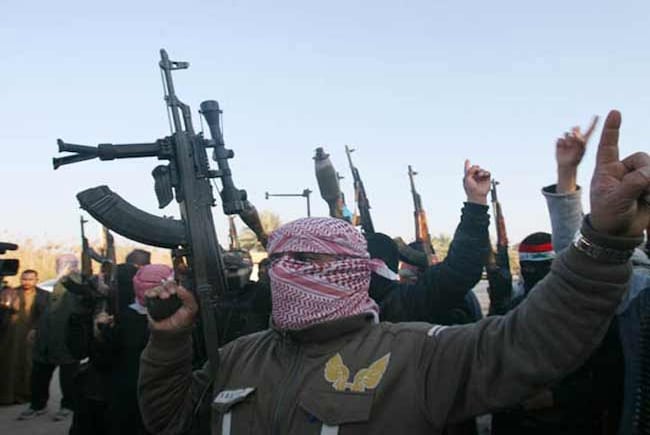
File Photo: Members of the Islamic State militant group. (Associated Press)
Erbil, Iraq:
Kurdish forces said they drove Islamic State out of several villages near the oil city of Kirkuk in northern Iraq on Wednesday after U.S.-led coalition airstrikes targeted insurgent positions overnight.
The assault, which began at dawn, is the latest of a number of offensives to consolidate Kurdish control over Kirkuk and drive the militants away. It also brought the peshmerga, the military forces of Iraq's autonomous Kurdistan region, closer to the insurgents' bastion of Hawijah.
Kurdish counter-terrorism forces said in a statement they, along with the peshmerga, had driven the militants out of four villages southwest of Kirkuk.
"At six in the morning, the peshmerga and counter-terrorism forces began to advance as part of a plan to clear several more villages from Daesh terrorists and advance to the vicinity of the Hawijah district," read the statement.
Daesh is a widely used Arabic name for the Islamic State group, also known as ISIL or ISIS.
The Kurds took full control of Kirkuk last summer when Iraqi soldiers abandoned their bases in and around the city as Islamic State militants overran around a third of the country including Hawijah, around 55 km (34 miles) to the west.
Kurdish leaders say they will never give up the ethnically mixed city, which sits outside the formal boundary of their region on some of Iraq's largest oil reserves, but to which they, as well as Turkmen and Arabs, lay claim.
The peshmerga have been widening a buffer around Kirkuk city in a series of offensives, clearing more than 530 square kilometres over the past six months, according to the region's security council.
The peshmerga, who gained battlefield experience fighting Saddam Hussein's forces when the autocrat was in power, are seen by the United States and its coalition partners as a vital deterrent against Islamic State, which wants to redraw the map of the Middle East.
Iraq's army is seen as highly ineffective and corrupt, and depends heavily on Iranian-backed Shi'ite militias in its efforts to contain Islamic State.
Apart from the gains around Kirkuk, the frontline between peshmerga and Islamic State has hardly moved for months.
Islamic State has not been able to take ground from the peshmerga since the U.S.-led coalition started bombing the insurgents.
The Kurds already control most of the territory they claim as their own, and have little incentive to push further into predominantly Arab towns and villages, except where they pose a direct threat to their region.
The assault, which began at dawn, is the latest of a number of offensives to consolidate Kurdish control over Kirkuk and drive the militants away. It also brought the peshmerga, the military forces of Iraq's autonomous Kurdistan region, closer to the insurgents' bastion of Hawijah.
Kurdish counter-terrorism forces said in a statement they, along with the peshmerga, had driven the militants out of four villages southwest of Kirkuk.
"At six in the morning, the peshmerga and counter-terrorism forces began to advance as part of a plan to clear several more villages from Daesh terrorists and advance to the vicinity of the Hawijah district," read the statement.
Daesh is a widely used Arabic name for the Islamic State group, also known as ISIL or ISIS.
The Kurds took full control of Kirkuk last summer when Iraqi soldiers abandoned their bases in and around the city as Islamic State militants overran around a third of the country including Hawijah, around 55 km (34 miles) to the west.
Kurdish leaders say they will never give up the ethnically mixed city, which sits outside the formal boundary of their region on some of Iraq's largest oil reserves, but to which they, as well as Turkmen and Arabs, lay claim.
The peshmerga have been widening a buffer around Kirkuk city in a series of offensives, clearing more than 530 square kilometres over the past six months, according to the region's security council.
The peshmerga, who gained battlefield experience fighting Saddam Hussein's forces when the autocrat was in power, are seen by the United States and its coalition partners as a vital deterrent against Islamic State, which wants to redraw the map of the Middle East.
Iraq's army is seen as highly ineffective and corrupt, and depends heavily on Iranian-backed Shi'ite militias in its efforts to contain Islamic State.
Apart from the gains around Kirkuk, the frontline between peshmerga and Islamic State has hardly moved for months.
Islamic State has not been able to take ground from the peshmerga since the U.S.-led coalition started bombing the insurgents.
The Kurds already control most of the territory they claim as their own, and have little incentive to push further into predominantly Arab towns and villages, except where they pose a direct threat to their region.
© Thomson Reuters 2015
Track Latest News Live on NDTV.com and get news updates from India and around the world

